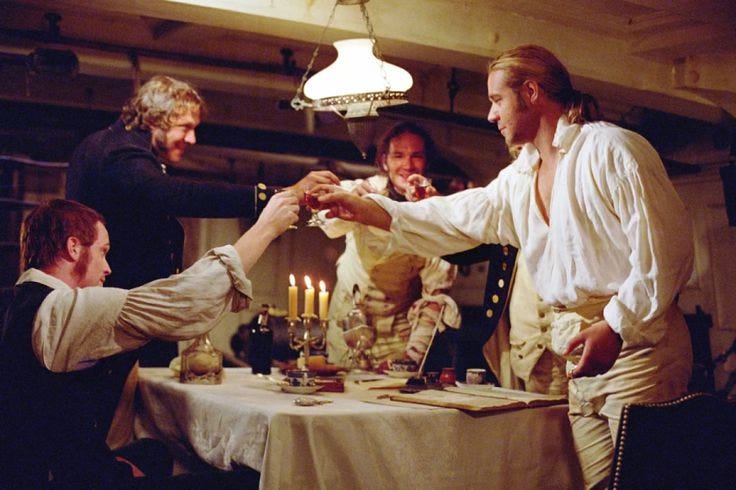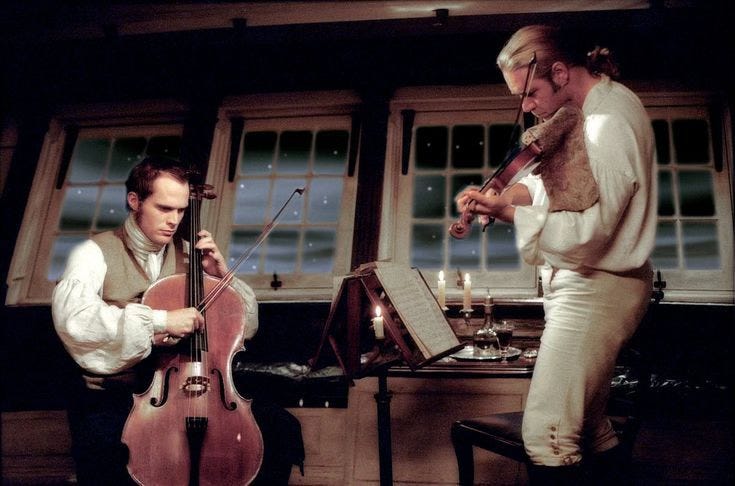Write & Lift is an ethos of personal and spiritual development through conscious physical exertion and practice of the writing craft. Through this effort to strengthen our bodies and minds, we become anti-fragile and self-respecting sovereign individuals. Through this effort, we may stand against untruth and evil and create a new culture of vitality, strength, and virtue.
Hierarchy Without Tyranny
In Master and Commander: The Far Side of the World, we see a masculine virtue increasingly foreign to us. It's not that such men no longer exist—they do—but rather that we've lost the cultural vocabulary to celebrate or even comprehend them.
Aubrey’s response to his ship HMS Surprises’ near-destruction from the larger and faster French Acheron isn't to retreat to a safe harbor but to pursue his enemy across two oceans. This isn't stubbornness or pride—it's an understanding that once accepted, duty must be carried through regardless of cost. As a capable and respected leader of men, Captain Aubrey is aware that competent decision-making requires grace under pressure. Aggression and dominance are tools in service to the task, but only when applied at the right moment and with the right knowledge of oneself.
Dr. Stephen Maturin serves as the rationalist complement to Aubrey’s dutiful spirit. As ship's surgeon and naturalist, he represents the scientific rationalism that our modern technocratic elite claim to embody. But unlike today's “experts,” Maturin's rationalism doesn't exist in opposition to traditional values—it serves them. His scientific knowledge is employed in service of the crew's collective mission, not as a replacement for it.
The friendship between these men illuminates something our current discourse desperately lacks. In one scene, they play violin and cello together in the captain's quarters, their instruments and melodies weaving in harmony while maintaining a distinct expressiveness. This isn't just a metaphor—it demonstrates how different modes of masculine excellence can complement rather than compete. A symbol of the secular enlightenment ideals of the early 19th century, Maturin needs Captain Aubrey’s gallantry and boyish courage as much as Aubrey needs the surgeon’s skepticism of authority and analytical problem-solving.
When men know who they are (and who they are not) they fall into a hierarchy without tyranny. Aubrey maintains discipline not through fear but through earned respect and demonstrated competence. He actively listens to Doctor Maturin, even when their ideas clash, and leaves little room for compromise.
As men, we know that personal and spiritual growth depends on knowing who we are. How do we react when we’re frustrated and angry? How do we solve problems? How do we structure a moral and philosophical foundation? Self-reflection is only one step in developing this conscious awareness of our personality and character. A man without close friends always falls into the well of his blind spots. Men of character don’t have friends they seek to assert themselves over; they have friends who share core values but differ in individual strengths and patterns of thought. The Type-A engineer needs creative “shoot-from-the-hip” people as much as the fat-funny guy needs friends who are addicted to the gym. Assuming, of course, that both are aiming up, agree on core principles, and are not caught in cycles of degeneracy or resentment.
Masculine virtue is not a historical curiosity for us to imagine and ponder while stroking our chins. If you want a guide for becoming a man of integrity and character, the worst thing you can do is adopt the affect and personality of red-pill gurus and masculine “cosplayers” spewing out hot takes for clicks. Look to the past (or, in the case of this post, representations of the past), where men were expected to embody specific virtues of courage, duty, honor, and integrity.
When people say men were “built different” they’re not just regurgitating a tired meme. When systems fail, it's not crippling bureaucracies that save us—it’s competent men bound by forgotten virtues working together toward a common purpose.
As always, thanks for reading
-Joe







Excellent piece, thank you
Could you pass the salt?